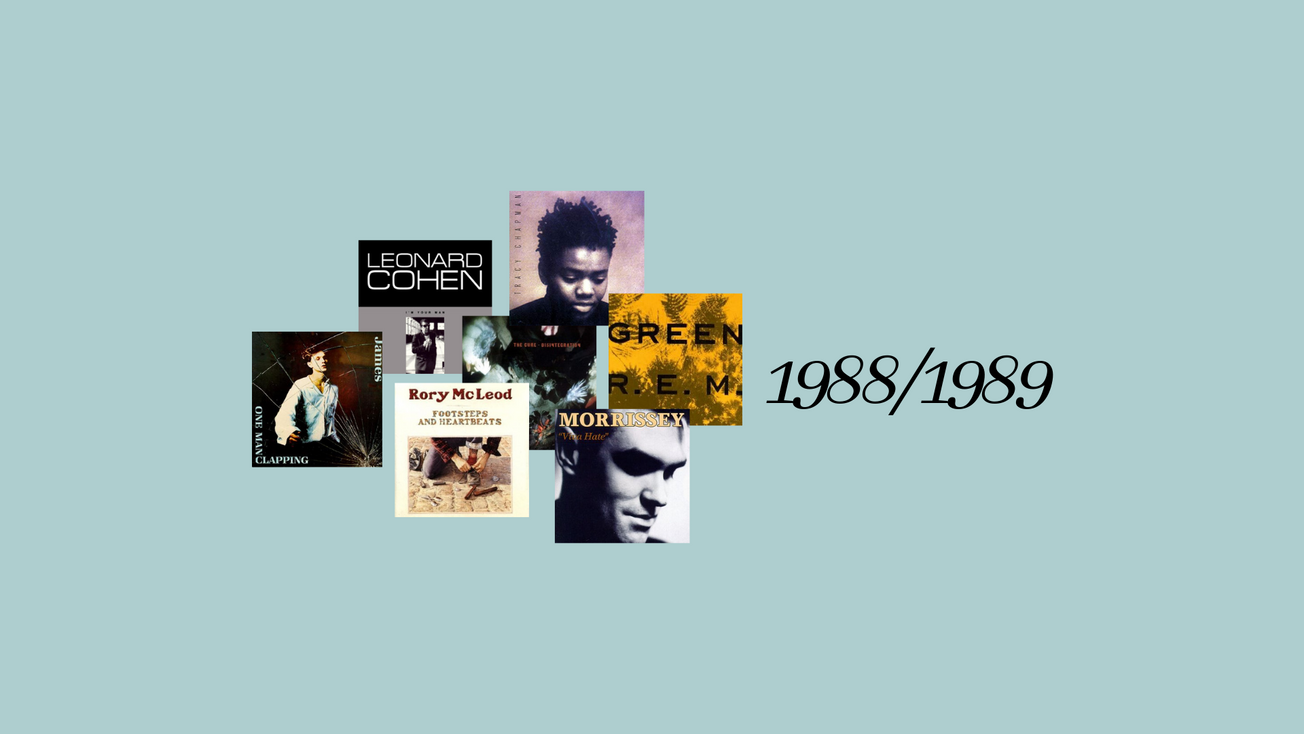By Epigram Music
Epigram Music run through some of the best records to come out of 1988 and 1989.

By Bethany Marris, Deputy Digital Editor
In an industry spoiled with endless possibilities of sonic manipulation and sampling, Tracy Chapman’s eponymous debut remains a testament to the power of unpretentious folk and sincere lyricism. While still at college, Chapman penned the album’s opening track, ‘Talkin’ Bout a Revolution’. In true academic fashion, Chapman harnesses her introduction to set the tone of the record, drawing upon the ills of society through a lens of hope and a call for change. Alongside confronting themes of racial segregation, domestic violence and endemic poverty, Chapman explores the minefields of love and and romantic longing. Politically and sentimentally profound yet not one bit audacious, there’s no mystery behind this record’s colossal success.

By Francesca Frankis, Music Editor (2019/2020)
The 2nd of May, marked exactly thirty years since the release of The Cure’s eighth studio album, Disintegration. The record showed a realised return to the dark, gloomy sound the Band had established some years before. It was the perfect antithesis after the release of more optimistic record, Kiss me, Kiss me. Smith’s sombre lyrics made their anticipated homecoming; ‘I think it's dark and it looks like it's rain’ he first sang over the epic and dark arrangement of Plainsong, the first track on the album. Disintegration saw The Cure gain true global success, reaching number three in the UK charts and peaking at twelve in the United States. It sold more than three million copies worldwide, the band’s best selling record to date. As an album Disintegration is an embodiment of the immersive and introspective genre of Rock The Cure had been fostering throughout the eighties, a truly unparalleled record.

By Alexia Kirov, Music Editor (2017-2019)
Could I really wrap up two years of Music editorial duties on anyone other than James? (If you know, you know). One Man Clapping is a live album recorded over three nights at the nearby Bath Moles club in November 1988; perhaps some of Epigram’s first writers were lucky enough to experience the historic gigs first-hand. CD copies of this indie chart-topper - funded by the band on a bank loan - are notoriously hard to track down for a reasonable price; vinyl versions crop up only slightly more frequently. Thanks to YouTube, however, it is not hard to hear why this LP is so revered by fans. One Man Clapping captures the ebullience of the band in the decade before continent-spanning tours and TV appearances; if I could get one more person to listen to it, I’d consider my time as Music Editor a success.

By, Mark Parker, Second year History
In a decade of profound musical change, Rory McLeod bucked the trend to produce a hidden gem composed in the traditional folk style. Having released two solo albums prior, the ex-circus clown and fire eater gained little further recognition from his 1989 release. Songs combine intricate guitar and harmonica with personal and intimate lyricism. Despite his relative anonymity, McLeod has received recognition from a series of veritable sources: Texas Harmonica Champion in 1981, Street Busker of the Year at the Edinburgh Festival in 1985, and Best Live Act at the BBC Radio 2 Folk Awards in 2002. McLeod’s technical ability is explicitly manifest in Footsteps and Heartbeats, and, using its compositional simplicity to its strength, the album showcases McLeod’s talent in such a way as to make the complex instrumentals accessible and infectious. A champion of the timeless troubadour style, McLeod produced in 1989 an album that sounds like it could’ve been released yesterday.

By Katie Hubbard, First year Geography
1988 marked the release of Morrissey’s first ever solo album following The Smiths parting ways in 1987. Produced and co-written by Stephen Street who also produced several of The Smith’s albums, Viva Hate is distinctly Morrissey at his unapologetic best. The album contains some of his most well-known solo songs including ‘Suedehead’ and the ever relevant ‘Everyday is like Sunday’, particularly prominent for any of us who have ever visited Clevedon on a rainy afternoon. The album showcases Morrissey’s prowess without Johnny Marr for back up. Despite initial scepticism preceding its release it was well received and is still regarded as one of Morrissey’s best albums to date. For who else apart from Morrissey can call for Armageddon and make it sound ever so appealing?

By Joe Gorecki, Deputy Music Editor (2018/2019)
An album full of existential dread for the imminent destruction of the environment and a raging authoritarian in the White House sounds like it could have been released yesterday but R.E.M.’s Green isn’t just an album full of its pointed political statements, it is also an album of a band at a crossroads. The album was their first for major label Warner Bros. and they haven’t entirely ditched their early college radio rock sound – ‘Orange Crush’ still remains one of R.E.M.’s guitar-led highlights ¬– but they’re beginning to embrace the more musically-varied and pop-oriented sensibilities that would catapult them to superstar status: ‘Hairshirt’ featuring lead guitarist Peter Buck’s experiments with the mandolin. Tracks like ‘Stand’ bring out the band’s anarchic joy while album highlight ‘World Leader Pretend’ showcases Michael Stipe intense thoughtful melancholy with some stellar string arrangements. R.E.M. would never be the same after Green and it remains a rewarding musical document of a band in flux.

An unapologetically ‘80s album from Leonard Cohen sounds like it wouldn’t work: his arrangements are often at their best when they give his poetry some space. I’m Your Man proves this wrong, however, justifying Cohen’s keen adoption of the synthesiser and drum machine and then some. The album features some of his best mid-career hits, opening with the incredible driving, apocalyptic ‘First We Take Manhattan’ and classic Cohen ballad ‘Ain’t No Cure for Love’. The album closes with the iconic ‘Tower of Song’, Cohen’s gentle, cool rumination on songwriting, aging and legacy. The first thing I ever wrote for Epigram was Leonard Cohen’s obituary and in the two and half years since his death, I’m Your Man is an album I keep coming back to: As enigma-filled as any in the Cohen back-catalogue, I’m Your Man is a confident portrait of a songwriter in his prime.
Featured Image: Bethany Marris / Epigram
Want to write a review for Epigram Music? Get in touch...
Facebook // Epigram Music // Twitter








